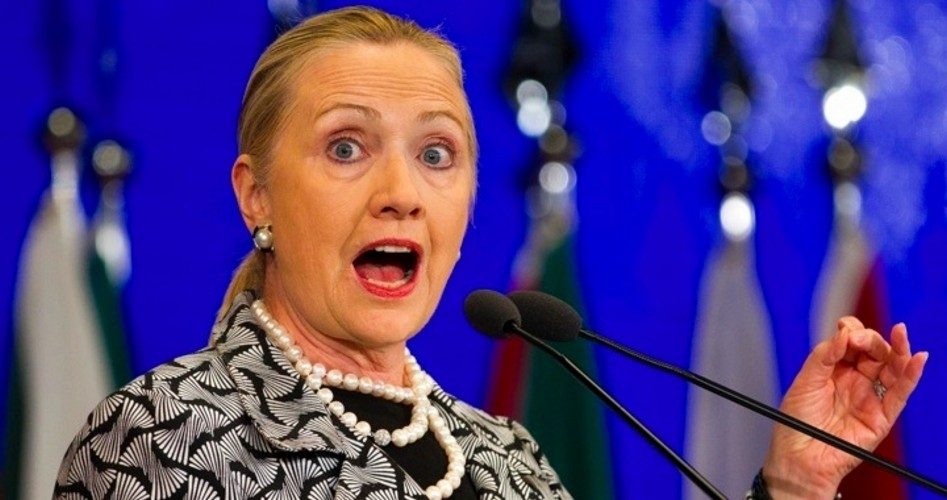
The federal government has done such a bang-up job of picking winners in the “clean energy” field here at home (see, e.g., Solyndra) that it is now planning to spend $20 million of taxpayers’ money on similar projects in Africa — with “hundreds of millions of dollars” to follow, according to Secretary of State Hillary Clinton.
Clinton, speaking at the United Nations Rio+20 Conference on Sustainable Development, announced the U.S.-Africa Clean Energy Finance Initiative, whose purpose, she said, is to “help clean energy projects in Africa get started.” The initiative involves three federal agencies: the State Department, the Overseas Private Investment Corporation (OPIC), and the U.S. Trade and Development Agency. “We plan to use an initial $20 million grant fund to leverage much larger investment flows from OPIC,” Clinton explained. “That will open the door then for hundreds of millions of dollars of OPIC financing, plus hundreds of millions of more dollars from the private sector for projects that otherwise would never get off the drawing board.”
“Clean energy,” she averred, “will bring new jobs, create new livelihoods, support education, new businesses, healthier and more productive lives, as well as reducing the emissions that contribute to climate change.”
But if clean energy is such a wonderful thing, why would these projects “otherwise … never get off the drawing board”? It’s not a matter of resources or technology, Clinton maintained, but of “obstacles and risks” that frighten off investors. “So if we can remove some of the risk and cover some of the costs of preparing a project,” she said, “we believe we can spur significant new private investments in clean energy.”
This is, of course, the same rationale that was applied to funding clean energy in the United States. The projects, so the government said, had great potential but were unable to get off the ground because of skittish private-sector investors. Thus, the government (i.e., taxpayers) had to step in and assume the risk. And what have taxpayers gotten in return for their “investments”? “At least 12 green energy firms that received about $6.5 billion from the [Obama] administration now face financial troubles, … with at least 5 companies declaring bankruptcy,” CNSNews.com reports.
It was also the rationale behind the creation of Fannie Mae and Freddie Mac for the purpose of financing mortgages that the private sector wouldn’t touch — and we all know how well that turned out.
The $20 million that the administration is so generously shelling out for African energy projects is just the beginning, as Clinton noted. OPIC is expected to kick in “hundreds of millions of dollars” in financing; and while OPIC is at present self-funding, should too many of the projects it backs go belly up, taxpayers will undoubtedly have to bail it out, too. Beyond that, said Clinton, the U.S. government is committed to spending “tens of billions of dollars a year over the next 20 years to extend our energy infrastructure” as part of its “commitment to the UN’s Sustainable Energy for All Initiative, which seeks to give all people everywhere access to clean energy.”
Therein lies another problem: In addition to being both unconstitutional and unwise, the aid disbursed under the U.S.-Africa Clean Energy Finance Initiative “is being handled by the famously corrupt United Nations as part of [a] costly plan to conquer global warming,” as Judicial Watch put it in a blog post criticizing the program.
Judicial Watch’s Tom Fitton told CNSNews.com that this latest $20-million plan “is part of billions and billions of dollars in foreign aid that’s gone for naught in Africa. Africa is worse off after receiving decades of foreign aid than it would have been if it hadn’t.” Moreover, he observed, the whole program is “based on dubious science and ideology. It has nothing to do with the needs of the people of Africa, whose needs often get short shrift to social planning and environmental extremism.”
Social planners, naturally, are in favor of such programs. Therefore, it comes as no surprise that the Council on Foreign Relations, an organization that has the best interests of neither Americans nor Africans at heart, has praised the U.S.-Africa Clean Energy Finance Initiative as one of “Rio+20’s unheralded achievements.”
Clean energy, whether in America, Africa, or elsewhere, may or may not be a good investment. The only way to find out is to see whether private investors are willing to risk their own money on it without a taxpayer backstop. If so, they don’t need taxpayer funding in the first place. If not, taxpayers shouldn’t be put at risk. The last thing Americans need in a time of persistent high unemployment and low economic growth is to have their hard-earned dollars confiscated for investment in boondoggles on the other side of the world.
Photo of Secretary of State Clinton at Rio+20: AP Images



